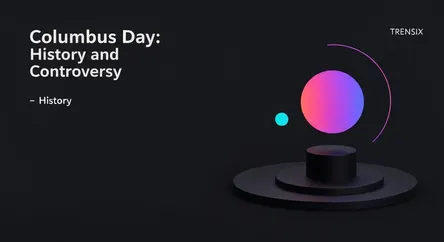History
Columbus Day: History and Controversy

An explainer on Columbus Day, a U.S. federal holiday marking Christopher Columbus's arrival in the Americas and the modern controversy surrounding it.
What is it?
Columbus Day is a U.S. federal holiday observed on the second Monday of October, commemorating Christopher Columbus's arrival in the Americas on October 12, 1492. It became a national holiday in 1937, largely through the efforts of Italian Americans who celebrate it as a day of heritage. Traditionally, the day is marked with parades and festivities. However, its official observance is inconsistent across the United States, with many states and municipalities no longer recognizing the holiday or having replaced it with an alternative commemoration.
Why is it trending?
Columbus Day is highly controversial due to the brutal impact of European colonization on Indigenous peoples. Critics argue that honoring Columbus ignores the violence, enslavement, and widespread death from disease he and other European explorers brought to the Americas. This has fueled a significant movement to replace the holiday with Indigenous Peoples' Day, which celebrates the history and resilience of Native American cultures. The push for this change has made the holiday a recurring topic of national debate, reflecting a broader reassessment of historical figures and events.
How does it affect people?
The holiday has a divided impact. For many Italian Americans, it is a meaningful celebration of their cultural heritage and contributions to the United States. For Native American communities and their allies, it is a painful reminder of the colonization, genocide, and loss of culture that began with Columbus's voyages. This fundamental disagreement influences public policy, school curricula, and community relations, forcing a conversation about which histories are officially celebrated. The debate surrounding the day highlights profoundly different perspectives on American history and identity.